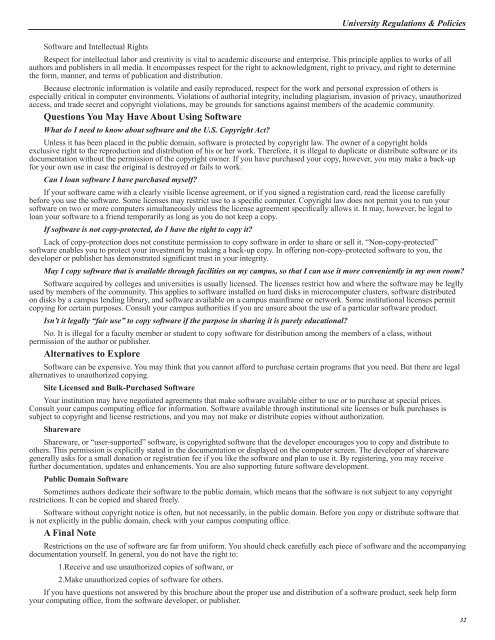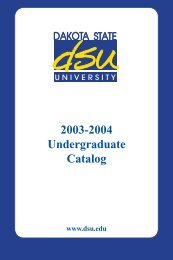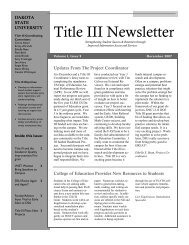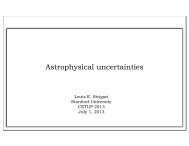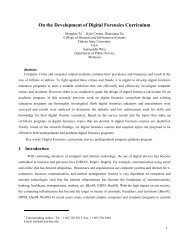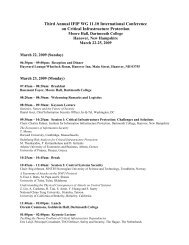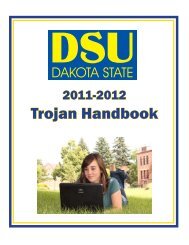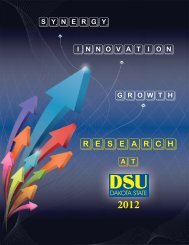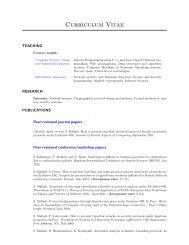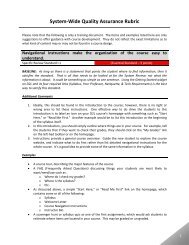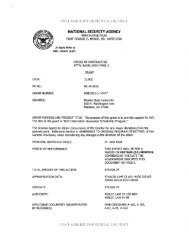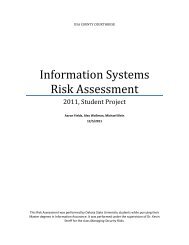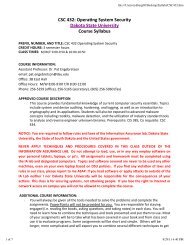Academic Calendar – Fall 2012 - Dakota State University
Academic Calendar – Fall 2012 - Dakota State University
Academic Calendar – Fall 2012 - Dakota State University
You also want an ePaper? Increase the reach of your titles
YUMPU automatically turns print PDFs into web optimized ePapers that Google loves.
<strong>University</strong> Regulations & Policies<br />
Software and Intellectual Rights<br />
Respect for intellectual labor and creativity is vital to academic discourse and enterprise. This principle applies to works of all<br />
authors and publishers in all media. It encompasses respect for the right to acknowledgment, right to privacy, and right to determine<br />
the form, manner, and terms of publication and distribution.<br />
Because electronic information is volatile and easily reproduced, respect for the work and personal expression of others is<br />
especially critical in computer environments. Violations of authorial integrity, including plagiarism, invasion of privacy, unauthorized<br />
access, and trade secret and copyright violations, may be grounds for sanctions against members of the academic community.<br />
Questions You May Have About Using Software<br />
What do I need to know about software and the U.S. Copyright Act?<br />
Unless it has been placed in the public domain, software is protected by copyright law. The owner of a copyright holds<br />
exclusive right to the reproduction and distribution of his or her work. Therefore, it is illegal to duplicate or distribute software or its<br />
documentation without the permission of the copyright owner. If you have purchased your copy, however, you may make a back-up<br />
for your own use in case the original is destroyed or fails to work.<br />
Can I loan software I have purchased myself?<br />
If your software came with a clearly visible license agreement, or if you signed a registration card, read the license carefully<br />
before you use the software. Some licenses may restrict use to a specific computer. Copyright law does not permit you to run your<br />
software on two or more computers simultaneously unless the license agreement specifically allows it. It may, however, be legal to<br />
loan your software to a friend temporarily as long as you do not keep a copy.<br />
If software is not copy-protected, do I have the right to copy it?<br />
Lack of copy-protection does not constitute permission to copy software in order to share or sell it. “Non-copy-protected”<br />
software enables you to protect your investment by making a back-up copy. In offering non-copy-protected software to you, the<br />
developer or publisher has demonstrated significant trust in your integrity.<br />
May I copy software that is available through facilities on my campus, so that I can use it more conveniently in my own room?<br />
Software acquired by colleges and universities is usually licensed. The licenses restrict how and where the software may be leglly<br />
used by members of the community. This applies to software installed on hard disks in microcomputer clusters, software distributed<br />
on disks by a campus lending library, and software available on a campus mainframe or network. Some institutional licenses permit<br />
copying for certain purposes. Consult your campus authorities if you are unsure about the use of a particular software product.<br />
Isn’t it legally “fair use” to copy software if the purpose in sharing it is purely educational?<br />
No. It is illegal for a faculty member or student to copy software for distribution among the members of a class, without<br />
permission of the author or publisher.<br />
Alternatives to Explore<br />
Software can be expensive. You may think that you cannot afford to purchase certain programs that you need. But there are legal<br />
alternatives to unauthorized copying.<br />
Site Licensed and Bulk-Purchased Software<br />
Your institution may have negotiated agreements that make software available either to use or to purchase at special prices.<br />
Consult your campus computing office for information. Software available through institutional site licenses or bulk purchases is<br />
subject to copyright and license restrictions, and you may not make or distribute copies without authorization.<br />
Shareware<br />
Shareware, or “user-supported” software, is copyrighted software that the developer encourages you to copy and distribute to<br />
others. This permission is explicitly stated in the documentation or displayed on the computer screen. The developer of shareware<br />
generally asks for a small donation or registration fee if you like the software and plan to use it. By registering, you may receive<br />
further documentation, updates and enhancements. You are also supporting future software development.<br />
Public Domain Software<br />
Sometimes authors dedicate their software to the public domain, which means that the software is not subject to any copyright<br />
restrictions. It can be copied and shared freely.<br />
Software without copyright notice is often, but not necessarily, in the public domain. Before you copy or distribute software that<br />
is not explicitly in the public domain, check with your campus computing office.<br />
A Final Note<br />
Restrictions on the use of software are far from uniform. You should check carefully each piece of software and the accompanying<br />
documentation yourself. In general, you do not have the right to:<br />
1.Receive and use unauthorized copies of software, or<br />
2.Make unauthorized copies of software for others.<br />
If you have questions not answered by this brochure about the proper use and distribution of a software product, seek help form<br />
your computing office, from the software developer, or publisher.<br />
32


